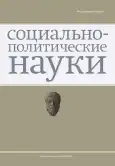Philosophical and Anthropological Aspects of Narcissism
- 作者: Dolgitsky O.D.1
-
隶属关系:
- Institute of State and Law, Surgut State University
- 期: 卷 13, 编号 4 (2023)
- 页面: 160-165
- 栏目: Philosophical anthropology, philosophy of culture
- URL: https://bakhtiniada.ru/2223-0092/article/view/145514
- DOI: https://doi.org/10.33693/2223-0092-2023-13-4-160-165
- ID: 145514
如何引用文章
详细
The article deals with the philosophical and anthropological aspects of narcissism as a specific characteristic of personality. The author analyzes the concept of “narcissism”, its causes, explains the narcissistic character from the point of view of psychoanalytic, philosophical-anthropological and cultural-historical psychological concepts. The purpose of the study is to define the concept of the phenomenon of narcissism and the principles of its formation. Results. As a result of the research, the author comes to the conclusion that the narcissistic personality type is the result of lack of personal development motivational-needs. As the basis for this conclusion, in the course of the research, specific properties of a narcissistic character are singled out, which are characteristic of describing the crisis of the age period of 3–7 years. The author concludes that in case of violation of intra-family relations, the process of self-identification is violated, as a result of which the structure of the Self freezes in development. The formation of this process determines how the child identifies himself with his parents and what role he takes in these relationships. At the same time, the author takes into account gender characteristics that determine the role of the child in the family and the attitude of the father and mother towards him. The author concludes that in order to overcome the narcissistic structure of the personality, personal reflection and introspective awareness of the act of one’s own consciousness is necessary, leading to the formation of a new structure of the psyche.
作者简介
Oleg Dolgitsky
Institute of State and Law, Surgut State University
编辑信件的主要联系方式.
Email: counteralex@rambler.ru
high-researcher doctorem, applicant at the department of philosophy and law
俄罗斯联邦, Surgut参考
- Vygotsky L.S. Questions of child psychology. St. Petersburg: SOYUZ, 1999. 224 p.
- Vygotsky L.S. Thinking and speech. St. Petersburg: Peter, 2017. 432 p.
- Gannushkin P.B. Selected works of Medicine. Moscow: Medicine, 1964. 292 p.
- Kernberg O.F. Relationships of love: norm and pathology. Translit. from English by M.N. Georgieva. Moscow: Independent firm “Class”, 2000. 256 p.
- Langle A. Existential-analytical theory of personality: Collection of articles. Translit. from Germany. Entry art. S.V. Krivtsova. Moscow: Genesis, 2005. 159 p.
- McWilliams N. Psychoanalytic diagnostics: Understanding the structure of personality in the clinical process. Translit. from English by V. Snigur. Moscow: Independent firm “Class”, 2015. 592 p.
- Ovid Publius Nason. Metamorphoses. Translit. from Latin by S. Shervinsky. Enter art. by S. Osherov. Note by F. Petrovsky. Moscow: Chud. lit., 1977. 421 p.
- Freud Z. Essays on the psychology of sexuality: Collection. Moscow: Eksmo, 2017. 310 p.
- Freud Z. Psychology of the masses and analysis of the human self. Translit. from Germany Ya. Kogan. Moscow: Publishing house “E”, 2016. 96 p.
补充文件













